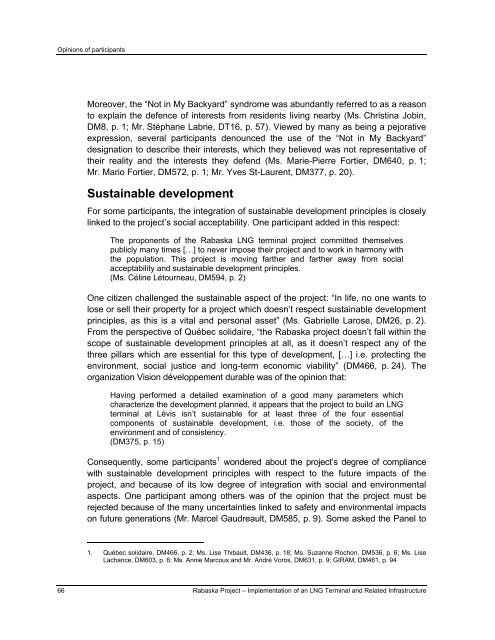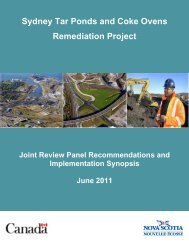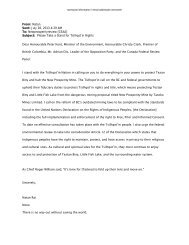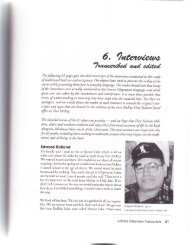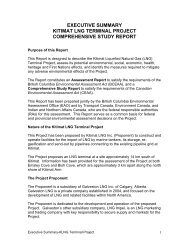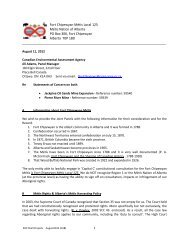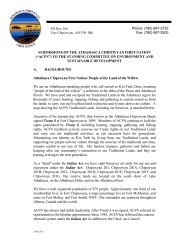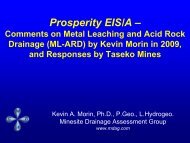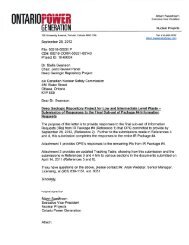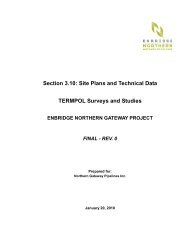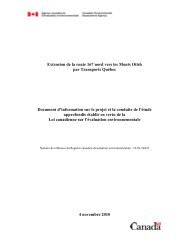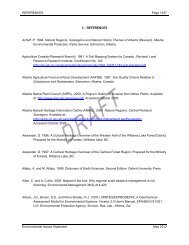Report - Agence canadienne d'évaluation environnementale
Report - Agence canadienne d'évaluation environnementale
Report - Agence canadienne d'évaluation environnementale
Create successful ePaper yourself
Turn your PDF publications into a flip-book with our unique Google optimized e-Paper software.
Opinions of participants<br />
Moreover, the “Not in My Backyard” syndrome was abundantly referred to as a reason<br />
to explain the defence of interests from residents living nearby (Ms. Christina Jobin,<br />
DM8, p. 1; Mr. Stéphane Labrie, DT16, p. 57). Viewed by many as being a pejorative<br />
expression, several participants denounced the use of the “Not in My Backyard”<br />
designation to describe their interests, which they believed was not representative of<br />
their reality and the interests they defend (Ms. Marie-Pierre Fortier, DM640, p. 1;<br />
Mr. Mario Fortier, DM572, p. 1; Mr. Yves St-Laurent, DM377, p. 20).<br />
Sustainable development<br />
For some participants, the integration of sustainable development principles is closely<br />
linked to the project’s social acceptability. One participant added in this respect:<br />
The proponents of the Rabaska LNG terminal project committed themselves<br />
publicly many times […] to never impose their project and to work in harmony with<br />
the population. This project is moving farther and farther away from social<br />
acceptability and sustainable development principles.<br />
(Ms. Céline Létourneau, DM594, p. 2)<br />
One citizen challenged the sustainable aspect of the project: “In life, no one wants to<br />
lose or sell their property for a project which doesn’t respect sustainable development<br />
principles, as this is a vital and personal asset” (Ms. Gabrielle Larose, DM26, p. 2).<br />
From the perspective of Québec solidaire, “the Rabaska project doesn’t fall within the<br />
scope of sustainable development principles at all, as it doesn’t respect any of the<br />
three pillars which are essential for this type of development, […] i.e. protecting the<br />
environment, social justice and long-term economic viability” (DM466, p. 24). The<br />
organization Vision développement durable was of the opinion that:<br />
Having performed a detailed examination of a good many parameters which<br />
characterize the development planned, it appears that the project to build an LNG<br />
terminal at Lévis isn’t sustainable for at least three of the four essential<br />
components of sustainable development, i.e. those of the society, of the<br />
environment and of consistency.<br />
(DM375, p. 15)<br />
Consequently, some participants 1 wondered about the project’s degree of compliance<br />
with sustainable development principles with respect to the future impacts of the<br />
project, and because of its low degree of integration with social and environmental<br />
aspects. One participant among others was of the opinion that the project must be<br />
rejected because of the many uncertainties linked to safety and environmental impacts<br />
on future generations (Mr. Marcel Gaudreault, DM585, p. 9). Some asked the Panel to<br />
1. Québec solidaire, DM466, p. 2; Ms. Lise Thibault, DM436, p. 18; Ms. Suzanne Rochon, DM536, p. 6; Ms. Lise<br />
Lachance, DM603, p. 6; Ms. Annie Marcoux and Mr. André Voros, DM631, p. 9; GIRAM, DM461, p. 94<br />
66 Rabaska Project – Implementation of an LNG Terminal and Related Infrastructure


